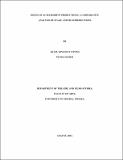Abstract:
Based on the dimension of application and operational framework of the concept of auteurship, auteur directors in stage and film productions believe in the supposition of taking control and close monitoring of all aspects of a production in order to achieve or actualise the directorial vision of a production. This study is aimed at ascertaining the following objectives: importance and limitations of each collaborator in stage and film productions, effects of Auteurship in stage and film productions, actual right and prerequisites of a director as the author of a production, issues of Auteurship in each phase of production: preproduction, production and post production, Differences and similarities in stage and film productions, differences and similarities of interpretative and creative director and the distinctions and similarities in stage and film directing. The study was based on two methodologies-Sociological and Literary methods due to their usefulness in information gathering. The theoretical framework of this study was anchored on Auteurship and Collaborative Theories to examine how a director as auteur could succeed without the collaboration of other artists in the production. In view of this without effective collaborative efforts of different artistic expects no production will be successful if the director is left alone to do all the work in the pretext of maintaining or showing coherency in styles, motif, themes, and vision in a production.
